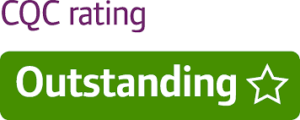It was a normal day for Mr Oakley, an active 61 year old man, an avid mountain biker, golfer and skier with two grown-up children. He liked to keep himself fit and enjoyed life. Mr Oakley had spent his adult life working in the motor industry, self-employed since his twenties and had plans to retire in two years time.
On this particular day, Mr Oakley went out on his mountain bike as planned but had a nasty fall from the bike leaving him in a coma with a significant brain injury.
Mr Oakley sustained a subdural haemorrhage and a basal skull fracture. He was transferred to a specialist NHS medical centre where he was in a coma for several weeks and underwent a craniotomy. From the acute medical hospital, he was transferred to an NHS rehabilitation hospital for the initial stages of structured rehabilitation. Mr Oakley had other complications around this time including the development of bacterial meningitis, hydrocephalous, pneumonia and a diagnosis of Bell’s palsy with a ‘ptosis’ (drooping of the eye-lid). He suffered a significant post-traumatic amnesia (estimated to have lasted around 4 months).
When our team assessed Mr Oakley, he had a number of rehabilitation needs to be addressed by our Community Rehabilitation Team prior to his being able to return home. Mr Oakley was admitted for an initial 8 week community assessment and this was followed by a 6 week phased programme returning him to his own home with a package of support. At this time, Mr Oakley was very happy to engage in the rehabilitation programme being offered but as a result of his brain injury, had little insight as to why he might actually need it.
The initial assessment by the Oakleaf Community Therapy Team identified some key areas for further rehabilitation work. These were: support with anterograde memory and difficulty with processing and retention of information, self-monitoring in social situations to prevent him becoming vulnerable, insight into the impact of his deficits on assessment of risk, planning and execution of daily living tasks e.g. food preparation, medication management and a full assessment of Mr Oakley in relation to him own home to identify what package of support he would need to enable him to go home and stay safe.
The key members of the Oakleaf Community Therapy Team involved in his programme were; neuropsychiatrist, neuropsychologist, physiotherapist, speech and language therapist, occupational therapist, horticultural therapist, family liaison worker and specialist residential rehabilitation workers. Each discipline used standardised and non-standardised assessment tools to assess Mr Oakley’s needs (e.g. EMQ, TFLS, RBMT3 and RDB) and put programmes in place to help him develop skills, compensatory techniques or external prompts (e.g. an electronic reminder for medication times, diaries etc) to enable him to manage as independently as possible at home and minimise risks in his home environment.
The team at The Oakleaf Community Houses worked with Mr Oakley within a planned and structured ‘sessional day’ in all the identified areas and worked closely with his family and friends who stayed very involved during his rehabilitation. Mr Oakley’s family and friends were an important link to both his past and future life. This information was helpful for the team to understand what Mr Oakley was like before his accident and which personality traits may have existed pre-morbidly but been exacerbated by the injury. Where these may not have caused a difficulty before the accident, when combined with the effects of the brain injury, the impact is often altered.
In order to support Mr Oakley with a successful transition to live back in his own home, the team identified areas where he would need some support and which professionals he would need to maintain a link with to ensure his continued progress.
Following a home assessment visit by the Oakleaf Team, Local NHS Community Brain Injury Team, family and friends were engaged in the 8 week graded withdrawal of Oakleaf staff support until Mr Oakley was able to stay at home with the support package identified for him.
Mr Oakley made a successful transition home and as his Bell’s palsy improves, he is planning to have a DVLA reassessment to start driving again. He is able to do many of the things he could do before but has accepted that sometimes he needs to adapt the task or his approach to it to stay safe and well.
Mr Oakley’s family and friends continue to be a huge support to him and the staff team at The Oakleaf Group Community Houses are delighted to have helped him to return home successfully after such a significant brain injury.
He continues to have difficulty in some areas of his functioning but is using the strategies he was taught to good effect.



 Find your next great career opportunity at The Oakleaf Group
Find your next great career opportunity at The Oakleaf Group